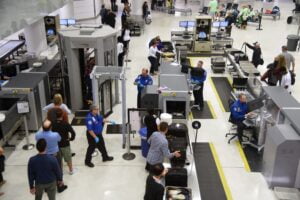ButSpeak.com
News which Matters.

US proposes a one-stop security agreement with India to enhance aviation safety and streamline passenger processing, marking a significant step in international travel efficiency.
In a bid to enhance global aviation safety and streamline passenger processing, the US Transportation Security Administration (TSA) has proposed a unique “one-stop agreement” with India. This initiative aims to eliminate the need for rescreening passengers and their baggage when transferring from international to domestic flights, thereby raising global aviation security standards.
Addressing the India-US Aviation Summit in Washington, TSA Administrator David Pekoske described the one-stop security concept as “very reachable” and beneficial for both countries. He emphasized that this approach would expedite passenger flow and reduce the duplication of security controls at transfer points.
The one-stop security agreement would mean that passengers arriving from one country and connecting to a domestic flight in another would not need to be rescreened. Their checked baggage would also transfer seamlessly between flights. Pekoske termed this as a “really powerful” concept, highlighting its potential to enhance security for flights inbound to the United States. Conversely, if the US screening meets Indian requirements, flights to India would also benefit from increased security.
Pekoske underscored the need for regular information exchange to maintain the agreement, noting that such a pact would require improvements in security processes. He added that this initiative could reduce security costs, improve passenger experience, and decrease flight connection times and missed connections.
To facilitate this agreement, Pekoske suggested that the two countries should consider signing a memorandum of agreement to share sensitive security information. He explained that while this information is not classified, it is sensitive and requires additional protections.
Pekoske pointed out that both the US and India’s transportation security measures were born from tragic events—the 1985 Air India Flight 182 bombing for India and the 9/11 attacks for the US. These incidents fundamentally changed how both nations approach transportation security.
US Federal Aviation Administrator Michael Whitaker also spoke at the summit, emphasizing the need for collaboration between the US and India on aviation safety. He highlighted that safety is a collective effort and sharing data between the two countries could help identify and mitigate risks in the aviation sector. Whitaker noted that the national aviation systems of the US and India are interconnected within a global network, stressing the importance of working together to enhance safety.
Whitaker remarked that while aviation accidents were once common, advancements in safety regulations have made them extremely rare. He stressed the need for proactive risk analysis and mitigation to prevent failures before they occur. Whitaker called for regulators to find a balance between safety and the rapid pace of technological advancements in the aviation sector.
As more people gain access to aviation, public expectations for safety increase, Whitaker said. He emphasized the need for regulators to adapt and ensure that new technologies are safely integrated into the airspace.
The proposed one-stop security agreement between the US and India represents a significant step towards improving global aviation safety and efficiency. By reducing redundancies in security processes, this initiative aims to enhance the travel experience for passengers while maintaining high-security standards.